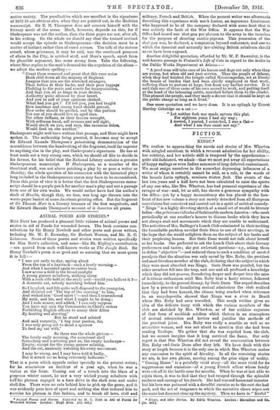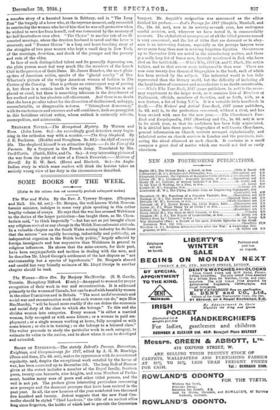FICTION.
XINGU.*
Wa confess to approaching the novels and stories of Mrs. Wharton. with mingled emotions, in which a reverent admiration for her ability, her subtlety, and her artistic skill is tempered by the apprehension— quite old-fashioned, we admit—that we must put away all expectations of happy endings or even Indian summers of long-deferred contentment. We must resign ourselves to the somewhat depressing influences of a writer of whom it certainly cannot be said, as a rule, in the words of the laconic Latin epitaph, neminern trigem fecit. The events of the last two years and a half have not been calculated to raise the spirits of any one who, like Mrs. Wharton, has had personal experience of the ravages of war—and, let us add, has shown a generous sympathy with the Allies—yet by a happy inconsistency she has placed in the fore- front of her new volume a story not merely detached from all European convulsions but conceived and carried out in a spirit of satirical comedy. " Xingu " is a highly diverting sketch of a small set of would-be literary ladies—the precieuses ridicules of fashionable modern America—who meet periodically at one another's houses to discuss books which they have not always read and movements which they are unable to understand. The activities of Mrs. Ballinger's Lunch Club culminated in their inviting the formidable problem novelist Osric Dane to ono of their meetings, in the hope that she would enlighten them on the subject of her books and their perplexing lessons. But Osric Dane would not talk about herself or her books. She preferred to ask the Lunch Club about their literary preferences and tastes ; she put awkward question—e.g., asking them to define " objective "—and reduced them to such a condition of mental paralysis that the situation was only saved by Mrs. Roby, the prettiest and most frivolous member of the club, declaring that the subject in which they were most absorbed was Xingu. Osrio Dane was puzzled, but the other members fell into the trap, and one and all professed a knowledge which they did not possess, floundering deeper and deeper into the mire of fictitious enthusiasm until Mrs. Roby beat a hasty retreat, followed immediately, to the general dismay, by Osric Dane. The sequel describes how by a process of humiliating mutual admissions the club realized that they had been hoaxed, the climax being reached when reference to an encyclopaedia showed that Xingu was a river in Brazil where Mrs. Roby had once travelled. This rough outline gives no idea of the delicate irony with which the various members of the club are sketched by Mrs. Wharton, or of her ruthless exposure of that form of snobbish sciolism which thrives in an atmosphere of mutual admiration and invites and justifies the methods of the practical joker. Mrs. Roby was really a sensible as well as an attractive woman, and was not afraid to mention that she had been reading Trollop°. We gather that she was expelled from the club, but we cannot imagine that it long survived the fiasco. Our only regret is that Mrs. Wharton did not reveal the conversation between Mrs. Roby and Osrio Dane after they left. We have dealt with this story at length because it is the only one in which Mrs. Wharton makes any concession to the spirit of frivolity. In all the remaining stories we are, in her own phrase, moving among the grim edges of reality. " Coming Home " is a painfully vivid story—all the more vivid for its suppressions and omissions—of a young French officer whose family were cut off in the battle zone for months. When he was at last able to rejoin them, it was to find that they had escaped through the splendid coolness and courage of his fiancée. She had rescued house and inmates but his love was poisoned with a dreadful surmise as to the cost she had paid, and the act of vengeance in which the narrative closes wipes out the score but does not clear up the mystery. Then we have in " Kerfol " • Xingu, and ether Stories. By Edith Wharton. London: Macmillan and Co. set4
a macabre story of a haunted house in Brittany, and in " The Long Run" the tragedy of a lover who, at the supreme moment, only succeeded in convincing the woman who loved him that he was self-protective when he wished to save her from herself, and was tormented by the memory of his half-heartedness ever after. "The Choice" is another tale of an ill- assorted marriage, where the drunken husband is saved and the lover is drowned; and " Bunner Sisters " is a long and heart-breaking story of the struggles of two poor women who kept a small shop in New York, of the marriage, desertion, and death of the younger and the poverty and ruin of the elder.
In face of such distinguished talent and its generally depressing use, the plain person must feel very much like the members of the Lunch Club in the presence of Osric Dane. Mr. James Huneker, the most plain- spoken of American critics, speaks of the "glacial cruelty " of Mrs. Wharton's picture of the vulgar American woman of fashion in The Custom of the Country. That is perhaps an extravagant way of putting it, but there is a certain truth in the saying. Mrs. Wharton is not glacial or cruel, but there is something inhuman in the detachment of her method and in her absolute self-effacement. And there is no doubt that she has a peculiar talent for the dissection of disillusioned, unhappy, uncomfortable, or disagreeable natures. " Triumphant democracy," with its exuberances and excesses and self-confidence, finds no panegyrist in this fastidious critical writer, whose outlook is eminently eclectic, cosmopolitan, and aristocratic.



























 Previous page
Previous page